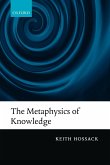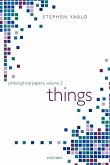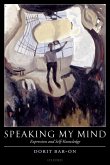- Broschiertes Buch
- Merkliste
- Auf die Merkliste
- Bewerten Bewerten
- Teilen
- Produkt teilen
- Produkterinnerung
- Produkterinnerung
Francois Recanati presents a ground-breaking study of the context-dependence of our language and thought. He argues that our linguistic and mental representations alike must be assigned two layers of content: the explicit content, which is relative and perspectival, and the complete content, which is absolute and involves contextual factors.
Andere Kunden interessierten sich auch für
![The Metaphysics of Knowledge The Metaphysics of Knowledge]() Keith HossackThe Metaphysics of Knowledge51,99 €
Keith HossackThe Metaphysics of Knowledge51,99 €![Essays on Skepticism Essays on Skepticism]() Anthony BruecknerEssays on Skepticism57,99 €
Anthony BruecknerEssays on Skepticism57,99 €![Scepticism Comes Alive Scepticism Comes Alive]() Bryan FrancesScepticism Comes Alive47,99 €
Bryan FrancesScepticism Comes Alive47,99 €![Things Things]() Stephen YabloThings45,99 €
Stephen YabloThings45,99 €![Anti-Externalism Anti-Externalism]() Joseph MendolaAnti-Externalism47,99 €
Joseph MendolaAnti-Externalism47,99 €![Speaking My Mind Speaking My Mind]() Dorit Bar-OnSpeaking My Mind66,99 €
Dorit Bar-OnSpeaking My Mind66,99 €![The Nature and Value of Knowledge The Nature and Value of Knowledge]() Duncan PritchardThe Nature and Value of Knowledge40,99 €
Duncan PritchardThe Nature and Value of Knowledge40,99 €-
-
-
Francois Recanati presents a ground-breaking study of the context-dependence of our language and thought. He argues that our linguistic and mental representations alike must be assigned two layers of content: the explicit content, which is relative and perspectival, and the complete content, which is absolute and involves contextual factors.
Hinweis: Dieser Artikel kann nur an eine deutsche Lieferadresse ausgeliefert werden.
Hinweis: Dieser Artikel kann nur an eine deutsche Lieferadresse ausgeliefert werden.
Produktdetails
- Produktdetails
- Verlag: OUP Oxford
- Seitenzahl: 320
- Erscheinungstermin: 1. November 2007
- Englisch
- Abmessung: 234mm x 156mm x 17mm
- Gewicht: 488g
- ISBN-13: 9780199230549
- ISBN-10: 0199230544
- Artikelnr.: 24711164
- Herstellerkennzeichnung
- Libri GmbH
- Europaallee 1
- 36244 Bad Hersfeld
- gpsr@libri.de
- Verlag: OUP Oxford
- Seitenzahl: 320
- Erscheinungstermin: 1. November 2007
- Englisch
- Abmessung: 234mm x 156mm x 17mm
- Gewicht: 488g
- ISBN-13: 9780199230549
- ISBN-10: 0199230544
- Artikelnr.: 24711164
- Herstellerkennzeichnung
- Libri GmbH
- Europaallee 1
- 36244 Bad Hersfeld
- gpsr@libri.de
François Recanati is Director of Research, CNRS (Institut Jean-Nicod), and Arché Professorial Fellow, University of St Andrews.
* PART 1 : MODERATE RELATIVISM
* 1. The framework
* 1: The distribution of content
* 2: Radical vs Moderate Relativism
* 3: Two levels of content
* 4: Branch points for Moderate Relativism
* 2. The debate over temporalism (1) : Do we need temporal
propositions?
* 5: Modal vs extensional treatments of tense
* 6: What is at stake?
* 7: Modal and temporal innocence
* 8: Temporal operators and temporal propositions in an extensional
framework
* 3. The debate over temporalism (2) : Can we believe temporal
propositions ?
* 9: An epistemic argument against temporalism
* 10: Rebutting Richard's argument
* 11: Relativistic disagreement
* 4. Relativization and indexicality
* 12: Index, context, and content
* 13: The two-stage picture : Lewis vs Kaplan and Stalnaker
* 14: Rescuing the two-stage picture
* 15: Content, character, and cognitive significance
* PART 2 : EXPERIENCE AND SUBJECTIVITY
* 5. Content and mode
* 16: Duality and the fallacy of misplaced information
* 17: The content of perceptual judgments
* 18: Episodic memory
* 6. Immunity to error through misidentification
* 19: Implicit self-reference
* 20: Weak and strong immunity
* 21: Quasi-perception and quasi-memory
* 22: Reflexive states
* 7. Relativization and reflexivity
* 23: The (alleged) reflexivity of de se thoughts
* 24: Reflexivity : internal or external ?
* 25: What is wrong with Reflexivism
* 8. The first person point of view
* 26: De se thoughts and subjectivity
* 27: Memory and the imagination
* 28: Imagination and the self
* 29: Imagination, empathy, and the quasi-de se
* PART 3 : EGOCENTRICITY AND BEYOND
* 9. Unarticulated constituents in the lekton ?
* 30: The context-dependence of the lekton : how far can we go ?
* 31: Unarticulatedness and the 'concerning' relation
* 32: Three (alleged) arguments for the Externality Principle
* 33: Invariance
* 10. Self-relative thoughts
* 34: The problem of the essential indexical
* 35: Perry against relativized propositions
* 36: Context-relativity
* 37: Basic and nonbasic de se thoughts
* 11. Shiftability
* 38: The Generalized Reflexive Constraint
* 39: Parametric invariance and m-shiftability
* 40: Free shiftability
* 41: The anaphoric mode : a Bühlerian perspective
* References
* 1. The framework
* 1: The distribution of content
* 2: Radical vs Moderate Relativism
* 3: Two levels of content
* 4: Branch points for Moderate Relativism
* 2. The debate over temporalism (1) : Do we need temporal
propositions?
* 5: Modal vs extensional treatments of tense
* 6: What is at stake?
* 7: Modal and temporal innocence
* 8: Temporal operators and temporal propositions in an extensional
framework
* 3. The debate over temporalism (2) : Can we believe temporal
propositions ?
* 9: An epistemic argument against temporalism
* 10: Rebutting Richard's argument
* 11: Relativistic disagreement
* 4. Relativization and indexicality
* 12: Index, context, and content
* 13: The two-stage picture : Lewis vs Kaplan and Stalnaker
* 14: Rescuing the two-stage picture
* 15: Content, character, and cognitive significance
* PART 2 : EXPERIENCE AND SUBJECTIVITY
* 5. Content and mode
* 16: Duality and the fallacy of misplaced information
* 17: The content of perceptual judgments
* 18: Episodic memory
* 6. Immunity to error through misidentification
* 19: Implicit self-reference
* 20: Weak and strong immunity
* 21: Quasi-perception and quasi-memory
* 22: Reflexive states
* 7. Relativization and reflexivity
* 23: The (alleged) reflexivity of de se thoughts
* 24: Reflexivity : internal or external ?
* 25: What is wrong with Reflexivism
* 8. The first person point of view
* 26: De se thoughts and subjectivity
* 27: Memory and the imagination
* 28: Imagination and the self
* 29: Imagination, empathy, and the quasi-de se
* PART 3 : EGOCENTRICITY AND BEYOND
* 9. Unarticulated constituents in the lekton ?
* 30: The context-dependence of the lekton : how far can we go ?
* 31: Unarticulatedness and the 'concerning' relation
* 32: Three (alleged) arguments for the Externality Principle
* 33: Invariance
* 10. Self-relative thoughts
* 34: The problem of the essential indexical
* 35: Perry against relativized propositions
* 36: Context-relativity
* 37: Basic and nonbasic de se thoughts
* 11. Shiftability
* 38: The Generalized Reflexive Constraint
* 39: Parametric invariance and m-shiftability
* 40: Free shiftability
* 41: The anaphoric mode : a Bühlerian perspective
* References
* PART 1 : MODERATE RELATIVISM
* 1. The framework
* 1: The distribution of content
* 2: Radical vs Moderate Relativism
* 3: Two levels of content
* 4: Branch points for Moderate Relativism
* 2. The debate over temporalism (1) : Do we need temporal
propositions?
* 5: Modal vs extensional treatments of tense
* 6: What is at stake?
* 7: Modal and temporal innocence
* 8: Temporal operators and temporal propositions in an extensional
framework
* 3. The debate over temporalism (2) : Can we believe temporal
propositions ?
* 9: An epistemic argument against temporalism
* 10: Rebutting Richard's argument
* 11: Relativistic disagreement
* 4. Relativization and indexicality
* 12: Index, context, and content
* 13: The two-stage picture : Lewis vs Kaplan and Stalnaker
* 14: Rescuing the two-stage picture
* 15: Content, character, and cognitive significance
* PART 2 : EXPERIENCE AND SUBJECTIVITY
* 5. Content and mode
* 16: Duality and the fallacy of misplaced information
* 17: The content of perceptual judgments
* 18: Episodic memory
* 6. Immunity to error through misidentification
* 19: Implicit self-reference
* 20: Weak and strong immunity
* 21: Quasi-perception and quasi-memory
* 22: Reflexive states
* 7. Relativization and reflexivity
* 23: The (alleged) reflexivity of de se thoughts
* 24: Reflexivity : internal or external ?
* 25: What is wrong with Reflexivism
* 8. The first person point of view
* 26: De se thoughts and subjectivity
* 27: Memory and the imagination
* 28: Imagination and the self
* 29: Imagination, empathy, and the quasi-de se
* PART 3 : EGOCENTRICITY AND BEYOND
* 9. Unarticulated constituents in the lekton ?
* 30: The context-dependence of the lekton : how far can we go ?
* 31: Unarticulatedness and the 'concerning' relation
* 32: Three (alleged) arguments for the Externality Principle
* 33: Invariance
* 10. Self-relative thoughts
* 34: The problem of the essential indexical
* 35: Perry against relativized propositions
* 36: Context-relativity
* 37: Basic and nonbasic de se thoughts
* 11. Shiftability
* 38: The Generalized Reflexive Constraint
* 39: Parametric invariance and m-shiftability
* 40: Free shiftability
* 41: The anaphoric mode : a Bühlerian perspective
* References
* 1. The framework
* 1: The distribution of content
* 2: Radical vs Moderate Relativism
* 3: Two levels of content
* 4: Branch points for Moderate Relativism
* 2. The debate over temporalism (1) : Do we need temporal
propositions?
* 5: Modal vs extensional treatments of tense
* 6: What is at stake?
* 7: Modal and temporal innocence
* 8: Temporal operators and temporal propositions in an extensional
framework
* 3. The debate over temporalism (2) : Can we believe temporal
propositions ?
* 9: An epistemic argument against temporalism
* 10: Rebutting Richard's argument
* 11: Relativistic disagreement
* 4. Relativization and indexicality
* 12: Index, context, and content
* 13: The two-stage picture : Lewis vs Kaplan and Stalnaker
* 14: Rescuing the two-stage picture
* 15: Content, character, and cognitive significance
* PART 2 : EXPERIENCE AND SUBJECTIVITY
* 5. Content and mode
* 16: Duality and the fallacy of misplaced information
* 17: The content of perceptual judgments
* 18: Episodic memory
* 6. Immunity to error through misidentification
* 19: Implicit self-reference
* 20: Weak and strong immunity
* 21: Quasi-perception and quasi-memory
* 22: Reflexive states
* 7. Relativization and reflexivity
* 23: The (alleged) reflexivity of de se thoughts
* 24: Reflexivity : internal or external ?
* 25: What is wrong with Reflexivism
* 8. The first person point of view
* 26: De se thoughts and subjectivity
* 27: Memory and the imagination
* 28: Imagination and the self
* 29: Imagination, empathy, and the quasi-de se
* PART 3 : EGOCENTRICITY AND BEYOND
* 9. Unarticulated constituents in the lekton ?
* 30: The context-dependence of the lekton : how far can we go ?
* 31: Unarticulatedness and the 'concerning' relation
* 32: Three (alleged) arguments for the Externality Principle
* 33: Invariance
* 10. Self-relative thoughts
* 34: The problem of the essential indexical
* 35: Perry against relativized propositions
* 36: Context-relativity
* 37: Basic and nonbasic de se thoughts
* 11. Shiftability
* 38: The Generalized Reflexive Constraint
* 39: Parametric invariance and m-shiftability
* 40: Free shiftability
* 41: The anaphoric mode : a Bühlerian perspective
* References









